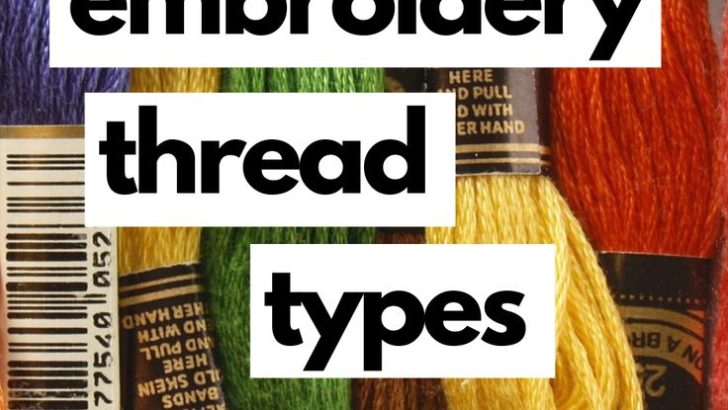Best embroidery thread is essential for achieving precise, professional-looking stitches that stand the test of time. Whether you’re a seasoned embroiderer or just starting out, choosing the right thread can make all the difference in the quality of your work. From vibrant colors to durable materials, the best embroidery threads are designed to provide consistency and longevity, ensuring that your projects look as good as they did on day one. With so many options available, it’s important to understand what makes a thread ideal for different types of embroidery, from traditional hand-stitching to modern machine embroidery.
Understanding the Different Types of Embroidery Threads
Embroidery threads come in various forms, each suited for specific techniques and styles. The most common types include polyester, rayon, cotton, and metallic threads. Polyester threads are known for their strength and color retention, making them a popular choice for both hand and machine embroidery. Rayon threads offer a luxurious sheen and are often used for more decorative projects, while cotton threads are favored for their softness and natural texture. Metallic threads add a touch of glamour and are typically used for embellishments. Each type has its own unique properties, and selecting the right one depends on the project’s requirements and desired outcome.
Key Factors to Consider When Choosing Embroidery Thread
When selecting the best embroidery thread, several factors should be taken into account. First, consider the material of the thread, as this affects its durability and appearance. For example, polyester threads are highly resistant to fading and stretching, making them ideal for long-lasting projects. Second, pay attention to the thread weight, which refers to the thickness of the strand. Heavier threads are better for bold designs, while lighter threads work well for intricate details. Third, evaluate the colorfastness of the thread, especially if the finished piece will be exposed to sunlight or frequent washing. Lastly, think about the compatibility of the thread with your sewing machine or hand-embroidery tools, as some threads may require special needles or tension settings.
Top Brands Known for High-Quality Embroidery Threads
Several brands have established themselves as leaders in the embroidery thread market, offering products that meet the needs of both hobbyists and professionals. One of the most trusted names is Gutermann, known for its high-quality polyester and rayon threads that provide excellent stitch definition and durability. Another popular brand is Mettler, which offers a wide range of threads suitable for both hand and machine embroidery. Coats & Clark is another well-known brand that produces reliable threads with consistent performance. These brands are often recommended by experts and have a reputation for producing threads that deliver exceptional results.
Tips for Maintaining and Storing Embroidery Thread
Proper maintenance and storage of embroidery thread can significantly extend its lifespan and ensure optimal performance. Always store your threads in a cool, dry place away from direct sunlight, as exposure to heat and light can cause fading and weakening of the fibers. It’s also a good idea to keep your threads organized in labeled containers or spools to prevent tangling and make it easier to find the right color when needed. Additionally, avoid using excessive force when threading your needle or machine, as this can cause the thread to break or fray. By following these simple tips, you can ensure that your embroidery thread remains in excellent condition for future projects.
How to Choose the Right Thread for Your Project
Selecting the right embroidery thread involves considering the specific needs of your project. For instance, if you’re working on a quilt or garment that will be washed frequently, opt for a thread that is colorfast and resistant to pilling. If you’re creating a decorative piece that will be displayed rather than used, you might prioritize a thread with a rich sheen or unique texture. Additionally, think about the type of embroidery you’re doing—hand embroidery may require a softer, more flexible thread, while machine embroidery often benefits from a stronger, more uniform thread. Experimenting with different threads on small swatches can help you determine which one works best for your particular design.
Conclusion
In conclusion, the best embroidery thread is a critical component of any successful embroidery project. By understanding the different types of threads available, considering key factors like material, weight, and colorfastness, and choosing reputable brands, you can ensure that your stitches are flawless and your projects last for years. Proper maintenance and storage of your threads will also contribute to their longevity and performance. Whether you’re working on a simple design or an intricate masterpiece, the right thread can elevate your work from good to exceptional. With the right knowledge and tools, anyone can achieve perfect stitches every time.
